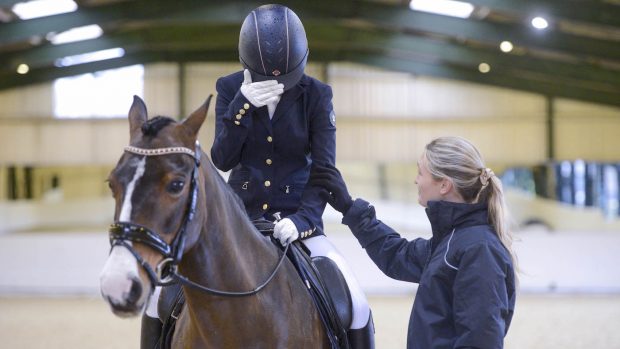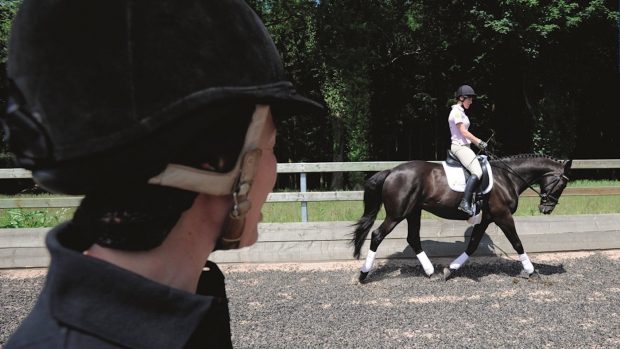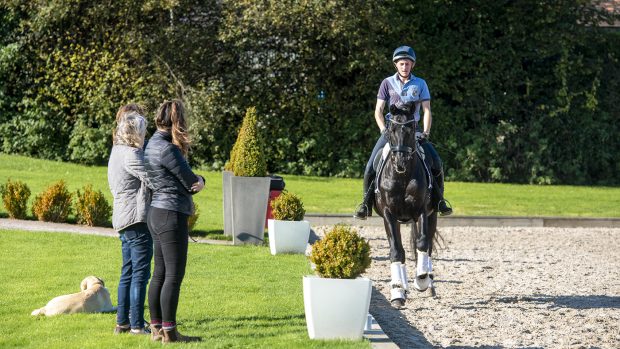Confidence is a state of mind which can have a considerable impact on your success rate and performance during training sessions or in competition. Have you ever considered the importance of confidence, what happens when your confidence is high or low and what affects your confidence levels?
“Confidence is key for any rider, without it we struggle to be resilient in times of hardship and when faced with challenges our negative self talk can turn into self doubt,” explains sport and performance consultant Camilla Henderson. “As a consequence this directly impacts performance negatively and we start to lose the ability to do the simple things well.”
Here Camilla Henderson and performance psychologist Zoe Taylor reveal eight ways in which you can build and improve your confidence.
1. Use self talk
Simply changing your language from ‘I’m not up to this’ or ‘I shouldn’t be here’ to ‘I can do it’ can have a profound effect on your confidence levels. Have confidence in your processes and self-compassion within what you are doing as confidence starts with self belief not self doubt.
2. Take your opportunities
For example when you are in the start box about to go cross-country or when you are riding to the start of a race, take that time to set your mind and be positive.
3. Identify what the biggest positive influence on your confidence is
It’s an individual response and there is no right or wrong answer but if you determine that something like ‘winning’ is your biggest positive influence consider what that means.
“Winning is an unstable source of confidence as it’s out of your control,” continues Camilla. “Being too outcome or ego focused can be detrimental long term so try to be more process focused. Say ‘I’m going to get this score in the dressage’ as it is a more stable place to draw confidence from.”
4. Try mindfulness
Mindfulness can be incredibly beneficial in competition if used correctly to maintain arousal or when things go wrong and you need to re-set.
Think about your processes and what you need to do at that moment in time. Having mentally rehearsed situations ahead of time can make the situation easier to deal with. When you are training or at home think through how you would react if, for example, you fell off, had a bad jump or got your striding wrong. Then, if it occurs you can be mindful, take the challenge in the moment, accept it and go with it.
“You can only ride what you have at that moment,” says performance psychologist Zoe Taylor from Taylored Mindset. “It doesn’t matter what happened in the warm up, last week or what will happen next week, it’s critical to be mindful, stay in the moment and deal with it.”
5. Implement behavioural triggers
Another common method to help you refocus and re-engage is to use behavioural triggers. Camilla has a mental process that she likes to follow at the start of a race and if she feels herself deviating from that she smacks her thigh to refocus. Using a behavioural trigger for optimal mindset is something that needs practising and won’t work overnight.
6. Experiment with different methods
While self talk can work for some people and behavioural triggers work for others, there are several other methods (listed below) to help you combat the challenges and unpredictable scenarios which competition day can throw up and it’s personal preference as to which works best for you.
- Mental imagery/visualisation
- Self talk skills
- Relaxation skills
- Breathing skills
- Goal setting programmes
- Centering skills (behavioural triggers)
If you want to implement relaxation or breathing skills into your pre-competition routine then start to practise them at home. Applying key mental skills to your training environment will benefit you on competition day.
7. Consider positives as well as negatives
Once the competition is over, reflect on what you have done well before looking at the negatives. Take something positive from the event or session even if you have had the day from hell.
8. Know your super strengths
Speak to your parents or trainers and ask them what you did well. Get their opinion on what you can work on. Also consider what you are good at and make these your ‘super strengths.’
Continued below…
Like this? You might also enjoy reading these:
7 ways to combat negative thoughts when it comes to your riding
13 performance psychology pointers to help improve your results
Subscribe to Horse & Hound this spring for great savings
Writing your key super strengths on the back of your hand on competition day can serve as useful reminders and confidence boosters. Don’t forget to spend time working on your super strengths as it’s important to practise your strengths just as much as your weaknesses.
“Working from a strengths-based focus rather than the typical constraints-based approach is a key part of positive psychology which can enhance multiple characteristics and behaviours such as confidence and belief which can lead to a more consistent and optimal performance, as well as facilitating intrinsic motivation,” says Zoe, who also designs and implements the academy psychology programme at Harlequins Rugby.
“We can also gain confidence through aspiring to the characteristics and behaviours of someone that inspires you. Watch their videos. Ask them questions. Learn from them and consistently keep growing.”
For more information visit tayloredmindset.co.uk or camillahenderson.co.uk.
We are continuing to produce Horse & Hound as a weekly magazine during the coronavirus pandemic, as well as to keep our website at horseandhound.co.uk up to date with breaking news, features and more. Click here for info about magazine subscriptions and access to our premium H&H Plus content online.





